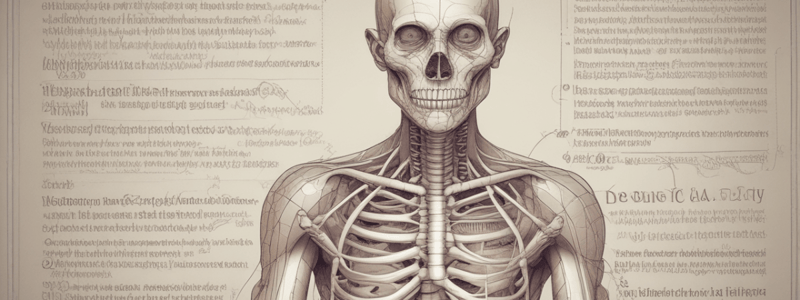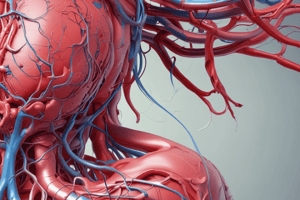Podcast
Questions and Answers
What is the term for the direction toward the midline of the body?
What is the term for the direction toward the midline of the body?
- Distal
- Lateral
- Proximal
- Medial (correct)
Which type of diagnostic test uses X-ray, CT, MRI, and Ultrasound?
Which type of diagnostic test uses X-ray, CT, MRI, and Ultrasound?
- Endoscopy
- Biopsy
- Laboratory
- Imaging (correct)
What is the term for the surgical procedure that removes damaged or diseased tissue?
What is the term for the surgical procedure that removes damaged or diseased tissue?
- Excision (correct)
- Transplantation
- Repair
- Amputation
Which type of treatment involves the administration of vaccines to prevent disease?
Which type of treatment involves the administration of vaccines to prevent disease?
What is the term for the emergency procedure to restore heart function?
What is the term for the emergency procedure to restore heart function?
Which region of the body refers to the chest?
Which region of the body refers to the chest?
What is the term for the direction closer to the point of attachment?
What is the term for the direction closer to the point of attachment?
Which type of diagnostic tool is used to listen to heart and lung sounds?
Which type of diagnostic tool is used to listen to heart and lung sounds?
Flashcards are hidden until you start studying
Study Notes
Anatomical Terminology
- Directional Terms:
- Superior: above or higher
- Inferior: below or lower
- Anterior: front or forward
- Posterior: back or rear
- Medial: toward the midline
- Lateral: away from the midline
- Proximal: closer to the point of attachment
- Distal: farther from the point of attachment
- Body Regions:
- Cephalic: head
- Thoracic: chest
- Abdominal: abdomen
- Pelvic: pelvis
- Upper limb: arm
- Lower limb: leg
- Body Cavities:
- Cranial: skull
- Thoracic: chest
- Abdominal: abdominal
- Pelvic: pelvis
Medical Diagnostics
- Diagnostic Tests:
- Imaging: X-ray, CT, MRI, Ultrasound
- Laboratory: blood, urine, tissue analysis
- Endoscopy: visualization of internal organs
- Biopsy: examination of tissue samples
- Diagnostic Tools:
- Stethoscope: listens to heart and lung sounds
- Blood pressure monitor: measures blood pressure
- Thermometer: measures body temperature
- Reflex hammer: tests reflexes
Surgeries
- Surgical Types:
- Open surgery: incision made to access the surgical site
- Minimally invasive surgery: small incisions or no incisions
- Laparoscopic surgery: uses a laparoscope to visualize the surgical site
- Robotic surgery: uses a robotic system to assist the surgeon
- Surgical Procedures:
- Excision: removal of damaged or diseased tissue
- Repair: repair of damaged tissue
- Transplantation: transfer of organs or tissues from one person to another
- Amputation: removal of a limb or digit
Treatments
- Pharmacological Treatments:
- Medications: prescription or over-the-counter drugs
- Vaccinations: administration of vaccines to prevent disease
- Non-Pharmacological Treatments:
- Physical therapy: rehabilitation and exercise to improve function
- Occupational therapy: rehabilitation to improve daily living skills
- Psychotherapy: talk therapy to address mental health issues
Interventions
- Medical Interventions:
- Cardiopulmonary resuscitation (CPR): emergency procedure to restore heart function
- Defibrillation: use of electrical shock to restore heart rhythm
- Oxygen therapy: administration of oxygen to improve breathing
- Nursing Interventions:
- Wound care: management of wounds to promote healing
- Pain management: administration of pain medications or other therapies
- Fall prevention: measures to prevent falls in patients
Anatomical Terminology
- Superior refers to a location above or higher in relation to another structure
- Inferior refers to a location below or lower in relation to another structure
- Anterior refers to a location in front of or forward in relation to another structure
- Posterior refers to a location at the back or rear in relation to another structure
- Medial refers to a location toward the midline of the body
- Lateral refers to a location away from the midline of the body
- Proximal refers to a location closer to the point of attachment of a limb or organ
- Distal refers to a location farther from the point of attachment of a limb or organ
- The cephalic region refers to the head
- The thoracic region refers to the chest
- The abdominal region refers to the abdomen
- The pelvic region refers to the pelvis
- The upper limb refers to the arm
- The lower limb refers to the leg
- The cranial cavity refers to the skull
- The thoracic cavity refers to the chest
- The abdominal cavity refers to the abdomen
- The pelvic cavity refers to the pelvis
Medical Diagnostics
- Diagnostic tests used in medicine include imaging, laboratory, endoscopy, and biopsy
- Imaging tests include X-ray, CT, MRI, and ultrasound
- Laboratory tests include blood, urine, and tissue analysis
- Endoscopy involves the visualization of internal organs
- Biopsy involves the examination of tissue samples
- Diagnostic tools used in medicine include stethoscope, blood pressure monitor, thermometer, and reflex hammer
- A stethoscope is used to listen to heart and lung sounds
- A blood pressure monitor is used to measure blood pressure
- A thermometer is used to measure body temperature
- A reflex hammer is used to test reflexes
Surgeries
- Surgical types include open surgery, minimally invasive surgery, laparoscopic surgery, and robotic surgery
- Open surgery involves making an incision to access the surgical site
- Minimally invasive surgery involves making small incisions or no incisions
- Laparoscopic surgery involves using a laparoscope to visualize the surgical site
- Robotic surgery involves using a robotic system to assist the surgeon
- Surgical procedures include excision, repair, transplantation, and amputation
- Excision involves the removal of damaged or diseased tissue
- Repair involves the repair of damaged tissue
- Transplantation involves the transfer of organs or tissues from one person to another
- Amputation involves the removal of a limb or digit
Treatments
- Pharmacological treatments include medications and vaccinations
- Medications can be prescription or over-the-counter drugs
- Vaccinations involve the administration of vaccines to prevent disease
- Non-pharmacological treatments include physical therapy, occupational therapy, and psychotherapy
- Physical therapy involves rehabilitation and exercise to improve function
- Occupational therapy involves rehabilitation to improve daily living skills
- Psychotherapy involves talk therapy to address mental health issues
Interventions
- Medical interventions include cardiopulmonary resuscitation (CPR), defibrillation, oxygen therapy, and others
- Cardiopulmonary resuscitation (CPR) is an emergency procedure to restore heart function
- Defibrillation involves the use of electrical shock to restore heart rhythm
- Oxygen therapy involves the administration of oxygen to improve breathing
- Nursing interventions include wound care, pain management, and fall prevention
- Wound care involves the management of wounds to promote healing
- Pain management involves the administration of pain medications or other therapies
- Fall prevention involves measures to prevent falls in patients
Studying That Suits You
Use AI to generate personalized quizzes and flashcards to suit your learning preferences.





